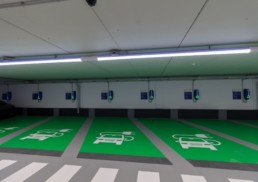The Platform for Electromobility warmly welcomes the EC’s willingness to revise the Directive on the energy performance of buildings (2010/31/EU, EPBD).
In light of the roadmap and scenarios proposed by the EC, the Platform does not only take a stand for the option 3 but points out that electromobility needs to be addressed as one of the key elements of the EPBD revision if the EU wishes to deliver the objectives set in the Smart and Sustainable Mobility Strategy, the Energy System Integration Strategy and the Renovation Wave Strategy. The deployment of private charging is as important for the growth of electromobility and the decarbonisation of transport as that of charging accessible to the public. The Platform also thinks that the electric bicycles (incl. e-cargo bikes, e-two-wheelers, e-moped and e-cars) should be considered when revising the EPBD.
Given that 90% of EV charging happens at home or in the workplace and that 80% of the EU’s current building stock will still be in used by 2050, the EC must tackle the outstanding barriers to the installation of EV chargers and collective charging infrastructure in all (non-) residential buildings to ensure that all EV users have a “right to plug”. In this regard, art. 8 of the EPBD should be revised.
To that end, the Platform shares its key recommendations.
Set minimum infrastructure requirements for all types of buildings (new and existing)
The EPBD should encourage Member States to implement measures to pre-equip all buildings. The Platform recommends putting in place minimum requirements for the pre-cabling of the installation of EV chargers and ensuring that all buildings will be pre-equipped by 2035.

Guarantee the right-to-plug to all EV users
The revision of the art. 8 of the EPBD must ensure the right-to-plug to all EV users in order to facilitate the installation of charging infrastructure for tenants and properties under shared ownership aligned with Spanish, Dutch and Norwegian legislations and the current EPBD recommendations. In France for instance, condominiums still face barriers when wishing to implement charging solutions due to non-adapted standards.
The EC needs to tackle the remaining obstacles for the installation of charging points in buildings by removing the unnecessary exemptions applied to SMEs and addressing the administrative hurdles (e.g. EV charging as extralegal benefit for employees) as well as collective action problems (e.g. split incentives between EV and non-EV drivers, renters vs. owners, employee vs. employer, etc.). The EC should ensure that the right to plug is as simple as a subscription to other services like internet, phone provider, etc. The request for the installation of charging stations in collective properties should not exceed 3 months. EV users without charging station at home should have a right to plug at work.

Introduce requirements for smart charging
The development of smart charging in buildings is an opportunity for EV users: it ensures a better charging experience, reduces the consumers’ electricity bill1 and could reintegrate the surplus of electricity into the grids (V2G) and/or reuse it in the buildings (V2B). It could also support the uptake of electromobility and can create synergies with renewable energies by integrating them into the electricity grids and providing flexibility services to the system.
Aligned with a definition on smart charging that the Platform urges to be introduced in the revision of the Alternative Fuels Infrastructure Directive (AFID), the existing requirements set in art.8 of the EPBD should be strengthened to support the deployment of smart charging in multi-family and nonresidential buildings in order to provide flexibility services to the power system via EV connection to the grid and to buildings.
The EPBD must be revised in coherence with the AFID to ensure the same level of ambitions in both texts and a coherent framework for the deployment of charging infrastructure across Europe. In line with the Renovation Wave, the EC also needs to ensure that funding and recovery plans tackle the rollout of smart charging infrastructure in the building renovations. A long-term funding programme (about 10 to 15 years) for local authorities and governments could be developed for example and channelled through the Member States to support the cabling of residential and office buildings’ in all parking spots.
